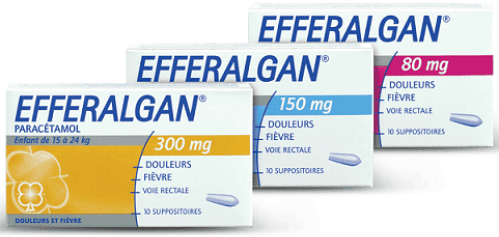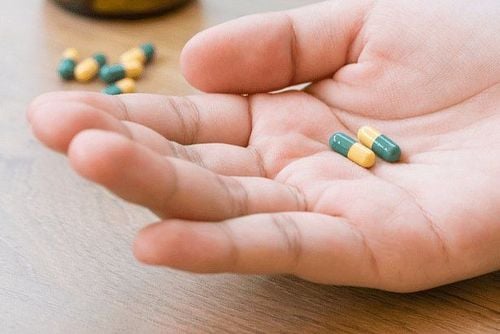This is an automatically translated article.
Aphaxan is a drug belonging to the group of anti-inflammatory, analgesic, and antipyretic drugs. When using, you need to consult a doctor to avoid unwanted effects. So what is the use of Aphaxan pain reliever and what should be noted when using it, please come to the following article.1. Uses of pain reliever Aphaxan
1.1 What is Aphaxan? Aphaxan is used to relieve headache, menstrual pain, toothache, arthritis, cold pain, fever, ... The drug is made in the form of tablets and in each tablet Aphaxan contains 325mg paracetamol, 200mg ibuprofen and some dozen Other drugs such as lactose, starch, povidone, magnesium stearate,...
Paracetamol, ibuprofen in Aphaxan are what drugs?
Paracetamol (acetaminophen) is a mild to moderate fever and pain reliever. The drug can lower body temperature in people with fever, but rarely in normal people. The exact mechanism of action of paracetamol is currently unknown. Ibuprofen is a non-steroidal anti-inflammatory drug, also known as NSAIDs. Ibuprofen works by stopping the body from making certain natural substances that cause inflammation. thereby helping to reduce swelling, pain or fever. The antipyretic effect of ibuprofen is stronger than aspirin, but less so than indomethacin. The anti-inflammatory effect of the drug appears after 2 days of treatment. 1.2 What is the use of Aphaxan pain reliever? The use of pain reliever Aphaxan is the effect of paracetamol, ibuprofen combined and is used in the following cases:
Arthritis, joint pain Back pain, muscle pain, neck curvature,... Rheumatoid arthritis: An autoimmune disease that affects many joints, especially small joints, often symmetrical. Juvenile arthritis: a chronic inflammatory joint disease, seen in children under 16 years of age, and diagnosed when no known cause. other arthritis. Toothache or pain after dental procedures Obstetric pain: dysmenorrhea, laparotomy,... Pain in trauma: fracture, dislocation, sprain,... Headache Fever Body aches due to cold, flu Pain in cancer
2. How to use Aphaxan pain reliever?
Aphaxan pain relievers are taken after meals with a dosage for adults from 1-2 tablets each time, 3 times a day in acute cases or take 1 tablet of Aphaxan each time, three times a day in chronic cases. In some necessary cases, it can be increased to a maximum of 8 tablets per day but must ensure the time to take each time 4-6 hours apart.
When you forget to take a dose of Aphaxan, take it as soon as you remember, but if it is too close to the time for the next dose, skip the missed dose of Aphaxan and take the next dose as usual, do not take a double dose of Aphaxan to make up for the missed dose. forget.
In case you overdose on Aphaxan and appear abnormal signs, please immediately contact or go to medical facilities.
3. In which case should Aphaxan not be used?
Cases where Aphaxan should not be used include:
People who are allergic to any ingredient of the drug or have a hypersensitivity reaction to aspirin or other NSAIDs Progressive gastric and duodenal ulcers Severe renal failure. People with deficiency of G6PD enzyme (glucose-6-phosphate dehydrogenase) Lupus erythematosus Bleeding disorder People taking coumarin anticoagulants Women in the last 3 months of pregnancy Advanced liver disease, alcoholics, inflammation viral liver People with bronchospasm or asthma
4. Which cases should be used with caution when using Aphaxan?
People who work as drivers, operate machinery: because Aphaxan can cause dizziness, affect the ability to concentrate at work Pregnant and breastfeeding women need to be careful when using Aphaxan Elderly people (people over 65 years old)
5. What side effects may I experience while using Aphaxan pain reliever?
When using Aphaxan, you may experience unwanted effects such as:
Fever Fatigue Abdominal Distention Nausea, vomiting Headache, dizziness Itching, rash Restlessness In addition, there are some Other less common side effects include:
Gastrointestinal bleeding, abdominal pain Progressive gastric ulcer Hematuria Stevens Johnson syndrome: a syndrome characterized by mucosal and skin lesions with signs and symptoms. such as skin peeling, blistering blisters, skin necrosis, ... The above does not include unwanted effects of Aphaxan, if there are any questions or unusual problems suspected due to use. Aphaxan you can contact your doctor or pharmacist for advice and timely treatment.
6. I should not use Aphaxan with any medicine or food?
During the use of Aphaxan should not be taken with:
Alcoholic beverages Anticoagulants Drugs for hypertension Diuretics Digoxin Insulin Colchicine Gold-containing compounds Other NSAIDs In short, use Aphaxan often regularly to get the most benefit from it. Absolutely do not arbitrarily increase the dose of the drug or abuse the drug for too long for a long time.
Please dial HOTLINE for more information or register for an appointment HERE. Download MyVinmec app to make appointments faster and to manage your bookings easily.













